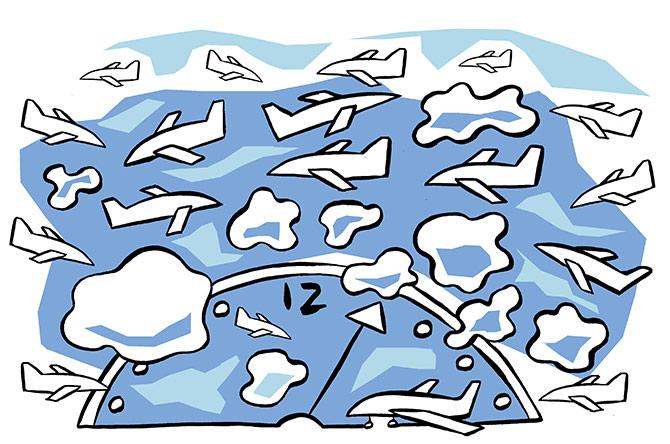 | « Back to article | Print this article |
While there is no concrete proposal as of now, possible options include raising funds through securitisation of ticket levy and reduction in number of subsidised seats on routes with higher demand.

The civil aviation ministry is searching for solutions to fund the regional connectivity scheme (RCS) even as only 136 of the 268 Udan routes are currently operational because of low demand.
While there is no concrete proposal as of now, possible options include raising funds through securitisation of ticket levy and reduction in number of subsidised seats on routes with higher demand, a ministry official said.
The three-year-old scheme, known as Udan, is funded through Rs 50 levy on flight tickets on major routes.
The levy contributes to 80 per cent of the viability gap fund (VGF) provided to the airlines, and the balance 20 per cent is provided by state governments.
Under the scheme, airlines are offered viability gap funding for 50 per cent of the seats on a flight and fares for those seats are capped by the government.
With the limited resumption of flights, VGF collection has dwindled, prompting the ministry to look at ways to rationalise the payout.
Domestic flights, including those under the RCS scheme, resumed on May 25 after suspension of two months.
While airlines are allowed to operate 45 per cent of their non-RCS flights, the actual number is less than 30 per cent.
Flight loads, too, are between 55 and 60 per cent, which means lower contribution to VGF.
While 688 RCS routes have been awarded to airlines since the launch of the scheme in 2017, only 268 were operational prior to April.
Alliance Air, IndiGo, SpiceJet, Star Air, and TruJet commenced flights on 146 of these routes after May 25.
Currently, these airlines are flying only 136 routes carrying around 16,400 passengers a week, while 10 routes have been dropped citing low demand.
Pre-April, while the collection from ticket levy was around Rs 35 crore a month, the payout to airlines was around Rs 60 crore.
The official said the ministry has a corpus, which would help it support the airlines for six months.
The bigger concern for the government now is revival of demand and financial health of airlines.
“Presently, there is no change in the scheme for collection of RCS levy. The ministry, however, is considering various options and innovative models,” the ministry said in an email response to queries.
The ministry has discussed with airlines regarding reduction in subsidy but sources said as demand for travel is very low, filling up flights at market fares would be even more challenging.
The ministry expects the demand to improve once quarantine restrictions are lifted, it said.
As an optimisation measure, the government has decided not to pay VGF for routes longer than 500 kms except in certain cases.
This has been done for three months from May and has led to suspension of a few RCS routes including Hubli-Hindon.
“Operating long and thin routes is our business plan.
"We are restricted to fly most of our allotted RCS routes temporarily and hope the ministry revokes this order soon,” said a Star Air spokesperson.
Star Air had to cancel Hubli-Hindon and Tirupati-Hubli flights and has deferred the launch of Gulbarga-Tirupati service.
Alliance Air said six of its routes are longer than 500 kms and the airline is operating all of them.
IndiGo and SpiceJet did not respond to queries.